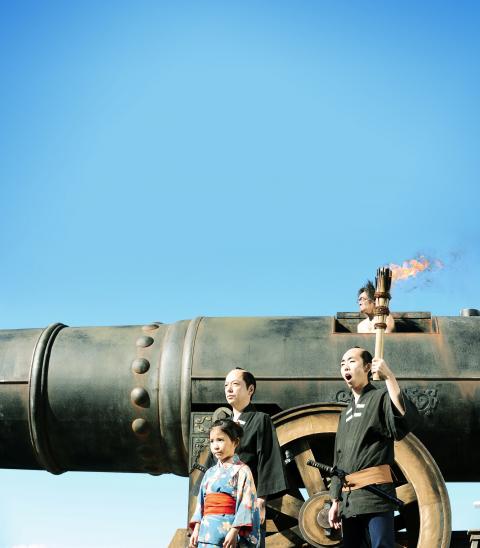Though this year’s Golden Horse Fantastic Film Festival (金馬奇幻影展) is only in its third edition, the fledging film showcase is already very popular.
Getting tickets to all the movies you want before they sell out requires standing in line next to a 7-Eleven ibon kiosk, as I did three weeks ago, on the first day of the advance ticket sales. And even if you are first in line, be prepared. You might have to spend one hour or so struggling with the ticketing system, which lags because of the surge of requests.
A spin-off of the established Taipei Golden Horse Film Festival (台北金馬影展), the newcomer has won support from younger audiences with its lineup of B movies, cult films and genre flicks. This year’s highlights include a retrospective on Spanish genre director Alex de la Iglesia, who is noted for his twisted cinematic world populated by militant cripples, sinful priests and next-door neighbors on a killing spree.

Photo Courtesy of Golden Horse Fantastic Film Festival
Iglesia entered the filmmaking business in the early 1990s when the then young director showed enough promise to secure Pedro Almodovar’s sponsorship on his feature debut Mutant Action (1993), a sci-fi comedy in which the world is ruled by the rich and the beautiful while a terrorist group of physically disabled people plot to overthrow the regime.
The director quickly became renowned for his outrageous humor and cartoonish violence and has continued to sharpen his inventive style in works such as The Day of the Beast (1995), a horror comic flick in which a Roman Catholic priest, heavy metal fan and television host are brought together with a common goal of capturing the Antichrist, and Common Wealth (2000), a black comic thriller that begins with a real estate agent discovering a fortune in the apartment of a dead man.
For horror fans, zombies roam the streets of Havana in Juan of the Dead from Cuba. But instead of grossing people out, director Alejandro Brugues weaves together humor and political commentary to tell a satirical tale in which the walking dead are labeled by the Cuban government as American dissidents trying to destabilize the communist island. To the locals, however, the zombies are just another messed-up part of life under Fidel Castro’s rule.

Photo Courtesy of Golden Horse Fantastic Film Festival
Meanwhile, the haunted-house genre meets Bollywood-style entertainment in Haunted 3D, which is billed as the first 3D horror flick ever produced by Bollywood. The film boasts an abundance of romance and dance and song routines.
Further north, Santa Claus turns out to be a malevolent being in local lore in the award-winning Rare Exports: A Christmas Tale, which begins with an American science expedition unintentionally releasing an evil force from its frozen prison.
In the queer film department, Eytan Fox, Israel’s most prominent gay director, gives the issue of ethnical and sexual conflict, which he explored in The Bubble and Yossi and Jagger, a rest and turns to warm and uplifting territory a la Mamma Mia and Glee with Mary Lou, a musical melodrama about a drag queen’s search for his mother and himself.
In Hong Kong, where the majority of movies are now made for the Chinese market and few films address the region’s distinctive, local identity, Johnnie To’s Life Without Principle (奪命金) is a rare find. In the movie, set against the backdrop of China’s overarching influence, the auteur offers sober insights into the region’s society during the 2008 economic crash.
Film buffs who like to reminisce might want to check out the festival’s Fantastic Cult section, which features oldies including Marilyn Monroe’s Some Like It Hot (1959), Dr Strangelove, or How I Learned to Stop Worrying and Love the Bomb (1964) and queer showpiece The Adventures of Priscilla, Queen of the Desert (1994).

Aug. 4 to Aug. 10 When Coca-Cola finally pushed its way into Taiwan’s market in 1968, it allegedly vowed to wipe out its major domestic rival Hey Song within five years. But Hey Song, which began as a manual operation in a family cow shed in 1925, had proven its resilience, surviving numerous setbacks — including the loss of autonomy and nearly all its assets due to the Japanese colonial government’s wartime economic policy. By the 1960s, Hey Song had risen to the top of Taiwan’s beverage industry. This success was driven not only by president Chang Wen-chi’s

Last week, on the heels of the recall election that turned out so badly for Taiwan, came the news that US President Donald Trump had blocked the transit of President William Lai (賴清德) through the US on his way to Latin America. A few days later the international media reported that in June a scheduled visit by Minister of National Defense Wellington Koo (顧立雄) for high level meetings was canceled by the US after China’s President Xi Jinping (習近平) asked Trump to curb US engagement with Taiwan during a June phone call. The cancellation of Lai’s transit was a gaudy

From Godzilla’s fiery atomic breath to post-apocalyptic anime and harrowing depictions of radiation sickness, the influence of the nuclear bombings of Hiroshima and Nagasaki runs deep in Japanese popular culture. In the 80 years since the World War II attacks, stories of destruction and mutation have been fused with fears around natural disasters and, more recently, the Fukushima crisis. Classic manga and anime series Astro Boy is called “Mighty Atom” in Japanese, while city-leveling explosions loom large in other titles such as Akira, Neon Genesis Evangelion and Attack on Titan. “Living through tremendous pain” and overcoming trauma is a recurrent theme in Japan’s

As last month dawned, the Democratic Progressive Party (DPP) was in a good position. The recall campaigns had strong momentum, polling showed many Chinese Nationalist Party (KMT) lawmakers at risk of recall and even the KMT was bracing for losing seats while facing a tsunami of voter fraud investigations. Polling pointed to some of the recalls being a lock for victory. Though in most districts the majority was against recalling their lawmaker, among voters “definitely” planning to vote, there were double-digit margins in favor of recall in at least five districts, with three districts near or above 20 percent in